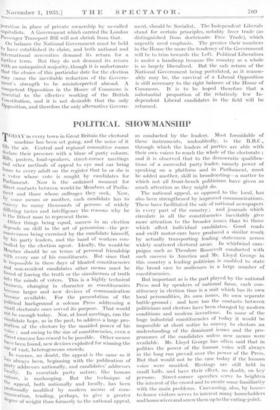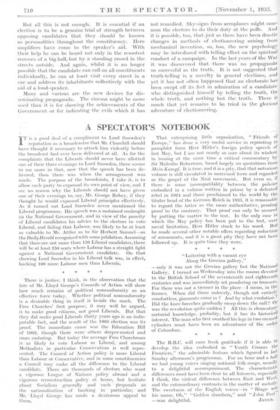POLITICAL SHOWMANSHIP
TODAY inevery town in Great Britain the electoral machine has been set going, and the noise of it fills the air. Central and regional committee rooms leelare their presence with a blaze of party colours. posters, loud-speakers, street-corner meetings aad other methods of appeal to eye and ear bring Mollie to every adult on the register that he or she is a voter whose . vote is sought by candidates for Parliament. Now is the ordained moment for direct contacts between would-be Members of Parlia- illent and those whose „suffrages they seek. Now, bY some means or another, each candidate has to convey to many thousands of persons of widely 'littering tastes and intelligence the reasons why he 1' the fittest man to represent them. Other things being equal, success in an election depends on skill in the art of persuasion—the per- suasiveness being exercised by the candidate himself, 11y his party leaders, and the band of workers con- trolled by the eleation agent. Ideally, the would-be Member should be on terms of personal friendship ‘vitli every one of his constituents. But since that is impossible in these days of bloated constituencies aild non-resident candidates other means must be found of forcing the truth or the simulacrum of truth 11110 the minds of voters. This is a highly technical 'usineSS, changing in character as constituencies l ecome larger and new devices of communication i 'eeoine available. For the presentation of the 1)°1itical background a solemn Press addressing a 414111 electorate once served its purpose. That would 'let be enough today. Nor, at local meetings, can the candidate hope, as in the past, to address a large pro- Portion of the electors by the unaided power of his Voice ; and owing to the size of constituencies, even a L'Ilrect canvass has ceased to be Possible. Other means IlaVe been foLd, new devices exploited for winning the cal of vast, heterogeneous crowds. In essence, no doubt, the appeal is the same as it las always been, beginning with the publication of party addresses nationally, and candidates' addresses c'eallY. In essentials party nature, like human nattire, is unchanging. But the technique of t he appeal, both nationally and locally, has been profoundly modified by modern means of corn- unication, tending, perhaps, to give a greater degree of weight than formerly to 'the national appeal, as conducted by the leaders. Most formidable of these instruments, undoubtedly, is the B.B.C., through which the leaders of parties are able with their own voices to reach the whole of the electorate ; and it is observed that to the democratic qualifica- tions of a successful party leader, namely power of speaking on a platform and in Parliament, must be added another, skill in broadcasting—a matter to which not all front-bench politicians have given as much attention as they might do. The national appeal, as opposed to the local, has also been strengthened by improved communications.. These have facilitated the sale of national newspapers in every part of the country ; and journals which circulate in all the constituencies inevitably give more attention to the broader issues than to those which affect individual candidates. Good roads and swift motor-cars have produced a similar result by actually transporting leading statesmen across widely scattered electoral areas. In whirlwind cam- paigns such as Theodore Roosevelt conducted with such success in America and Mr. Lloyd George in this country a leading politician is enabled to state the broad case to audiences in a large number of constituencies.
But important as is the part played by the national Press and by speakers of national fame, each con- stituency in election time is a unit which has its own local personalities, its own issues, its own separate battle-ground ; and here too the contacts between politicians and electors have been changed by modern conditions and modern inventions. In some of the huge industrial constituencies of today it would be impossible at short notice to convey to electors an understanding of the dominant issues and the pro- grammes of the candidates unless new means were available. Mr. Lloyd George has often said that in politics the power of the human voice will always in the long run prevail over the. power of the Press. But that would not be the case today if the human voice were unaided. Meetings are still held in small halls, and have their effect, no doubt, on key persons. Street-corner speeches serve to heighten the interest of the crowd and to create some familiarity with the- main problems. Canvassing, also, by house- to-house visitors serves to interest many householders and housewives and screw them up to the voting-point. But all this is not enough. It is essential if an election is to be a genuine trial of strength between opposing candidates that they should be known as personalities throughout the constituency. Here amplifiers have come to the speaker's aid. With their help he. can be heard not. only in the remotest recesses. of a big hall, but by a standing crowd in the streets. outside. And . again, whilst it is no longer possible that the candidate can call on all constituents individually, he can at least visit every street in a car 'and address its .inhabitants collectively with the aid of a loud-speaker.
Many and various are the new devices for dis- seminating propaganda. The cinema might be more used than it is for showing the achievements of .the Government or for indicating the evils which it has not remedied. Sky-signs from aeroplanes might sum- mon the electors to do. their duty at the polls. And it is possible, too, that just as there have been drastic changes in methods of electioneering arising from mechanical invention, so,. too, the new psychology may be intreduced with telling effect on the spiritual conduct of a campaign. • In the last years of the War it • was •.discovered that there was no propaganda so successful as the truth. It is not suggested that truth-telling is a • novelty in general elections; and yet it has not often happened that an electorate 'has' been swept off its feet in admiration of a candidate who distinguished himself by 'telling the truth, the whole truth, and nothing but the truth. There is much that yet remains to be tried in the gloriotis' adventure of electioneering,.



























































 Previous page
Previous page